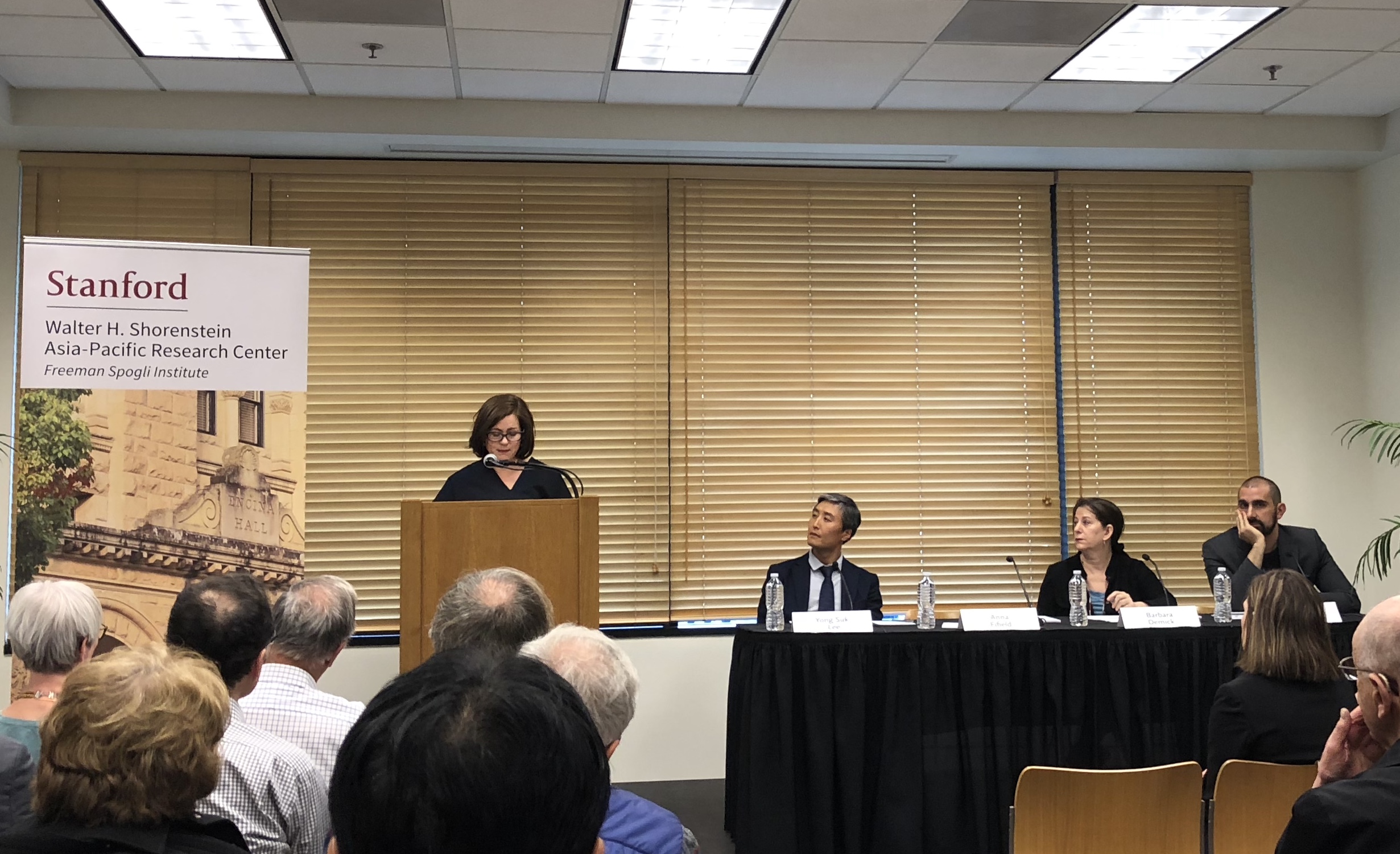On Wednesday, 2018 Annual Shorenstein Journalism Award recipient and Washington Post Beijing bureau chief Anna Fifield addressed economic changes in North Korea, as well as the country’s position in global diplomacy under the leadership of Kim Jong Un.
Fifield spoke as part of a panel including L.A. Times New York correspondent Barbara Demick, who is also a former head of the publication’s bureaus in Beijing and Seoul, and Andray Abrahamian, the 2018-19 Koret Fellow in APARC’s Korea Program. Demick received the 2012 Shorenstein Journalism Award. The panel was chaired by APARC Korea Program deputy director Yong Suk Lee, who is also a South Korea Center Fellow at the Freeman Spogli Institute.
Titled “How North Korea Is, and Isn’t, Changing under Kim Jong Un,” the panel was hosted by the Walter H. Shorenstein Asia-Pacific Research Center (APARC), which also presented its 17th annual Shorenstein Journalism Award to Fifield in a private award ceremony later Wednesday evening.
The Shorenstein Journalism Award honors a journalist or organization for work that has helped readers to understand the complexities of Asia. Fifield’s work focuses on East Asia, with a special concentration on North Korea.
One of Fifield’s primary foci in the panel was the change brought about by the establishment of markets in lieu of North Korea’s state ration system, which collapsed in the 1990s. As opposed to the rationing system, the markets allow for direct exchange of products with money.
According to Fifield, there are roughly 400 such markets throughout North Korea, and satellite imaging shows that they are continuing to expand. She said her interviews with North Korean escapees suggest that most citizens now get their food from the markets, while more than half of all citizens make a living through the markets.
Fifield said that the expansion of the markets under Kim has allowed life to improve, marginally for common people and significantly for elites. She added that, whereas “everyone” in North Korea was once visibly poor, there is now a growing wealth disparity between the two groups, as Kim “coddles” the elites to maintain their support.
“These markets are now simultaneously the biggest help to Kim Jong Un as he tries to sustain power, but also the biggest threat to his leadership,” Fifield said. “It struck me how little involvement in [the citizens’] daily lives the state had. They now have more agency than at any time before in their lives.”
Fifield said that the markets reduce the reliance of North Koreans on the regime, decreasing its power and leverage over them. In order to keep the populace pleased, however, she said Kim will have to show continuous progress. This is one motivation she cited for Kim’s diplomatic meetings with President Trump and South Korean President Moon.
“Kim Jong Un has managed to keep a hold of the system by operating a reign of terror, by using fear to keep people from agitating for change,” Fifield said. “We can see [Kim’s interactions with Trump and Moon] as an opportunity not just to reduce the threat of North Korea to us on the outside, but also help reduce the threat of the North Korean regime to the people on the inside.”
Fifield’s presentation was followed by remarks from Demick and Abrahamian. Demick talked about the difficulties she faced in her coverage of North Korea and the stories she heard from defectors that revealed their harsh living conditions in the country.
“Almost every North Korean you meet has had something horrible happen to them,” Demick said. “We can’t really normalize relations with this country in any way unless there’s some change, and I hope we can keep pushing on that.”
Abrahamian is part of Choson Exchange, a program that gives North Koreans economic training. He said that his work through this organization shows that old pathways to success, such as bureaucracy and military, have lost their popularity in the face of growing interest in business and diplomacy, fields that offer more access to the outside world.
The panel also discussed questions on information access, economic inequality and the effect of reporting about North Korea on public opinion.
“The most memorable portion of the panel was when they were discussing the politics of assimilation in regards to the defectors, and how this could have an overall impact on the views of North Korea in South Korea and affect the possibilities of reunification,” said Ben Villar, a first-year Masters student in the Center for East Asian Studies.
Contact Emily Wan at emilywan ‘at’ stanford.edu.
